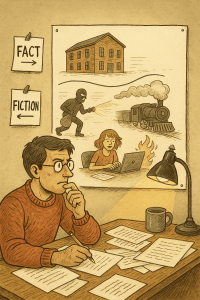
Most writing guides hit you with the same mantra: “write what you know.” But here’s the real deal: if every storyteller only wrote from personal experience, our bookshelves would look like one endless memoir section. Instead, embrace a little creative freedom—write what you know as a starting point, then let your imagination take off.
1. Start with a Grain of Truth, Then Wing It
Yes, grounding your story in something familiar-your hometown, your day job, your high – school hangout – gives readers a touchpoint. But don’t get hung up on perfect accuracy. Merging street names by a decade? Who cares, as long as the world you build feels lived-in. Once you’ve got that kernel of reality, go wild:
-
Invent a crooked diner owner who never existed.
-
Dream up a midnight train that veers off the map.
-
Imagine a private eye who talks to his teddy bear when no one’s watching.
2. Research to Add Credibility
If you want to pen a 1920s speakeasy scene, dive into Prohibition history – but don’t let research smother your plot. The goal is to seem like you’ve lived it, even if you haven’t:
“By the time your story hits shelves, readers should swear you were behind the wheel of that Model T.”
3. Why “Don’t Write What You Know” Matters for Crime Writers
In crime fiction, we’re all closet armchair criminals. Nobody expects you to have run a meth lab or survived a shoot-out – yet those gritty scenes keep us hooked. Start with a real cop-shop anecdote or a true-crime podcast episode, then crank up the stakes. Readers love the escape:
“I don’t need another tale of your boring commute. But show me a heist gone wrong at 3 AM? Hell yeah.”
4. Use Your Imagination as Your Best Ally
Science fiction authors craft entire galaxies from scratch. Romance writers spin elaborate love triangles in fantasy castles. Why should crime be any different? Let your “what-if” scenarios lead the way:
-
What if a small-town librarian was secretly a hacker-for-hire?
-
What if an undercover officer fell for the suspect’s sister?
-
What if your protagonist discovered evidence inside a wedding cake?
5. Make It Human – Even When It Gets Wild
As you stretch reality, keep your characters’ emotions real: fear, greed, jealousy, that rush of adrenaline when the getaway car squeals. Those universal feelings are what readers latch onto – even in the most outlandish plots.